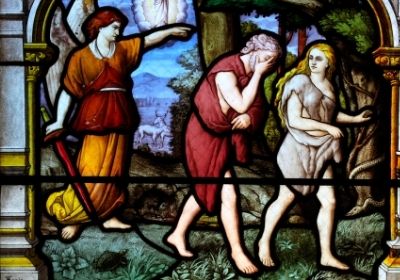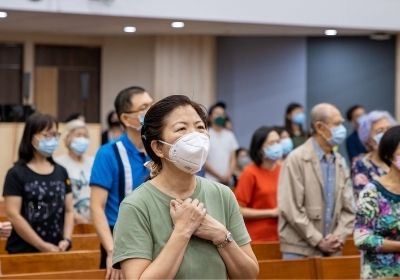By Rev Anthony Lee
Moses led the people out of slavery in Egypt in order to worship God. Egypt represents the world we live in; entering the Promised Land represents leaving the world behind to worship God in Church.
If we merely worship online, at our convenience, we are not truly “leaving” the world behind. Thus, there is great spiritual significance in our physical gathering for worship. Every time we gather as God’s people, it is a prophetic and spiritual declaration to both the seeing world and unseen forces that our allegiance is to God alone. Every week when we gather for worship, it is a spiritual re-enactment of our spiritual deliverance. It is a powerful reminder that we are in the world but not of the world.
- The physical gathering of believers is the weekly re-enactment of our spiritual deliverance from sin and our call to be separate from the world
The Bible repeatedly portrays a people in exile, who are brought back by God into His Presence. Right at the beginning of the Bible, we were told that Adam and Eve, after they sinned, were exiled, and cast out of the garden of Eden. Again, after the sin of humanity at the Tower at Babel, they were exiled and scattered across the face of the earth.

Even for the patriarchs of faith, the story of Joseph ends in Genesis 50 with him and his family in exile in Egypt. Perhaps the most famous historical exile we all know is the exile of both the Northern Kingdom of Israel by Assyria around 722 BCE and the Southern Kingdom of Judah by Babylon around 586 BCE.
Jesus’ death and resurrection, then, is to make a way back to God for us who are in spiritual exile. Of course, we still live in this “now-but-not-yet” tension whereby this return to God is not fully consummated; for we do not yet experience the realities of Revelation 21–22 when we return fully into God’s presence. In the meantime, living in the “now-but-not-yet”, our weekly gathering as God’s people is an important ritual which re-enacts this hope and faith we profess.
As I have shared before in the series “A New Exodus: Lessons from Covid-19” (see video below, or click here), our worship is a prophetic declaration that we will worship the Lord no matter what. In Exodus 7–10, Pharaoh tried to stop Moses & God’s people from worshipping. In that familiar story, Moses was told by God to confront Pharaoh and said, “Let my people go (to the wilderness so that they can worship Me)!” But obviously Pharaoh refused.
There is a greater spiritual significance behind this physical exodus account, especially in the arena of worship – see the pointers below:
- Slavery in Egypt // Slavery to sin (or Covid)
- Pharaoh // Satan while Moses // Jesus
- 1st level resistance (7:22): “No” => Gates of hell says “No” by default
- 2nd level (8:25): “Stay in the land to worship.” => Worship without any change is meaningless
- 3rd level (8:28): “Go but not too far.” => Worship without significant change is not good enough
- 4th level (10:11): “Let the men alone go” => Worship without family is not God’s intention
- 5th level (10:24): “All go but leave flocks & herds behind.” => Worship without sacrifice is not complete
- The physical act of gathering as God’s people for worship is the necessary reminder that we cannot remain in sin, nor do we follow the ways of the world.
- The Christian faith has always been a congregational and communal faith
While salvation is personal, the expression and practice of Christian faith has never been purely private. One of the problems of evangelicalism (e.g. think “Four Spiritual Laws”) is that we have preached individual salvation at the expense of corporate salvation. But throughout church history, salvation is never individualistic. We are the Body of Christ. The Body of Christ imagery necessarily implies every part of the Body needs to come together.
We may not feel like worshipping with others makes a difference to us; but the point is that it’s not about us – the focus must always be on God. Our Heavenly Father delights in His children gathering as His spiritual family.

Moreover, this would be helpful to us in different seasons of our lives. When we find ourselves unable to pray, we can lean upon the prayers and presence of others. Conversely, when our faith is strong and we aim to be like Christ in his sacrificial love, our prayers and presence are God’s provision for those who are weak.
As Methodists, we must also remember that individual worship is the farthest removed from Wesley’s mind. Wesley wrote, “‘Holy solitaries’ is a phrase no more consistent with the Gospel than holy adulterers. The Gospel of Christ knows no religion but social; no holiness, but social holiness.” This means, we cannot grow as Christians alone. Although this statement is more suited for cell groups and class meetings, the application for larger congregational settings is also relevant. For Wesley – and really, for all Christians – both private and public worship are non-negotiables.
With or without Covid, the above are theologically and biblically the most important reasons why we must gather as God’s people for worship. Every time we gather as God’s people, we proclaim we are no longer in spiritual exile, we are no longer homeless or hopeless, we are God’s people, and He is God our Saviour and deliverer.
For more related content, please follow us on Facebook and/or Instagram.